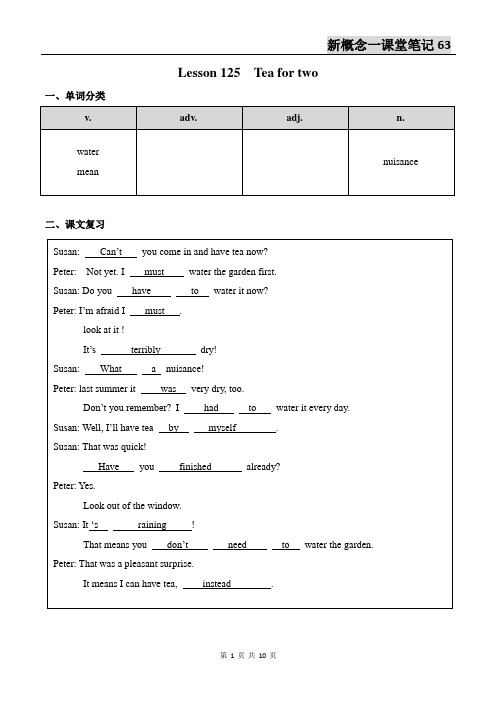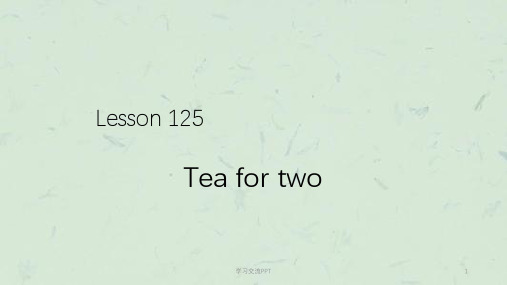新概念英语第一册第125-126课:Tea for two
新概念英语-第一册-第125-126课PPT课件

eg:I’m surprised at her answer.我对她的回答感到惊讶
.
9
immediately adv. 立即地,紧接地
eg:If you hear alarm,leave the building immediantely.要是听见警报,马上离开大楼.
eg:June comes immediately after May.
make a nuisance of oneself = make oneself a nuisance 惹人讨厌
eg: Don’t make yourself a nuisance to others. 不要做一个令人讨厌的人。
.
7
mean (meant ; meant) v.意味着,意 思是
What does the word mean? 这个单词是什么意思?
淋浴房 http://www.linyufang.so/ 整体淋浴房 0 圬罔牁
Homework
1.预习lesson125课文 2.单词5+ 3.课后习题作业
.
13
5.To my s________, she is a teacher. 二.Changing words.
1.It's_________(terrible) dry.
st summer it ______(be) wet.
3.I'll have tea by ______(I).
4.Have you ________ (finish) already?
.
2
waste water
sweet water water quality
hot water
新概念英语第一册Lesson125-126笔记(语法点+配套练习+答案)

I'mterriblysorry.我非常抱歉。
I’ve got aterribletoothache.我得了要命的牙疼。
dry
1.adj.干燥的
反义词:wet
2.v.使...变干
It is alwaysdryinfall.秋天天气干燥。
2. ____ bright girlsthey are!
A. WhatB. What a C. How D. How a
3. ____ interestingthe film is!
A. What B. What anC. HowD. How a
4. ____ sunny day! Let’s go out for a walk.
这个单词是什么意思?
The red lightmeans stop.红灯意味着停止。
Imean to traveltomorrow.
我打算明天去旅行。
surprise 1. n.意外的事,吃惊
to one’s surprise令某人吃惊的是
2.v.令人吃惊
surprising adj.令人吃惊的(物)
surprised adj.感到吃惊的(人)
be surprised at sth.对…感到惊讶
To my surprise, she is the mother of two children.
令我惊讶的是,她竟然是两个孩子的妈妈。
Youalways surpriseme.你经常让我惊喜。
This is such asurprisingthing.
我爷爷正在花园里浇花。
一杯水a glass of water
新概念一第125-126课精品课件

What a nuisance!
01
02
这是对Peter所说的“It’s terribly dry”这句话的评价
6. Last summer it was very dry, too. Don’t you remember? I had to water it every day. ① last summer / week / year this spring / week next year / month ② had to 是have to 的过去式,说明过去不得不做的事情 我昨天早晨必须早起来赶班车。 I had to get up early yesterday morning to catch the bus. ③Don’t you remember? 否定疑问句
Key words&expressions
1. water ⑵ n. 水;海水;雨水;海域,大片的水 Give me a glass of water. 用船运by water = by ship =by sea 邮递员用船运送包裹。 Postmen send the packages by water. 花钱如流水 spend money like water 我的姐姐总是花钱如流水。 My sister spends her money like water.
Key words&expressions
5.mean (meant ; meant) ⑴v. 意思是 What do you mean by saying that? 你那么说是什么意思? 这个单词什么意思? What does the word mean? = What’s the __________ of the word? 红灯意味着“停车”。 The red light means “stop”.
新概念英语第一册第125-126课-Tea for two

新概念英语第一册第125-126课:Tea for twoLesson 126 Have to and do not need to不得不和不必要New words and expressions生词和短语immediatelyadv.马上地Lesson 125-126 自学导读First things first课文详注Further notes on the text1.Cant you come in and have tea now, Peter?彼得,你现在能进来喝茶吗?这是否定疑问句,表示邀请。
请参见第77-78课_Terrible toothache语法部分。
2.Dont you remember?你不记得了吗?这也是否定疑问句。
3.dont need to= neednt。
表示“不必”,是must和have to的一般现在时否定式。
4. a pleasant surprise,意想不到的好事,令人惊喜的事。
语法Grammar in usemust, have to和neednt这3个词都表示必要性。
在前面已对must和have to介绍过。
must是情态助动词,而have to是一般动词,二者在确定句中一般可以互换,表示不行躲避的义务或责任。
must更带有说话人的主观颜色,而have to则更强调客观要求和外界影响。
must一般只能表达现在的必要性,而have to则可以表达过去或将来的必要性。
对比例句:Must you go now?你必需现在就走吗?Yes,I have to leave at once.是的,我不得不立刻就走。
Yes,1 must leave at once.是的,我必需立刻就走。
I shall have to leave London tomorrow.我明早得离开伦敦。
I had to stop smoking because it was forbidden in my company.由于我所在的公司内禁止抽烟,所以我不得不停止了吸烟。
新概念英语第一册125-126课课件

• 你不跟我来么?不,我要跟你去的。
• --Won’t you come with me?
• --Yes, I will.
• water 用作动词,在构词法上属于转化,即词由一个
词性转为另一个词性,词义随之变化。
学习交流PPT
9
• Do you have to water it now? • have to 必须,不得不 • 否定式,疑问式的构成要借助助动词do. • 我必须等他吗?不,不必。 • Do I have to wait for him? • No, you don’t have to. • must 则不需要再借助助动词 • 我必须现在就见他吗? • Must I see him now? • Yes, you must. • No, you needn’t .
• to one’s surprise
• 让我惊讶的是,她已经是两个孩子的妈妈了。
• To my surprise, she was the mother of two children.
• 2)v. 使…惊讶,使…吃惊
• 你总是让我吃惊。
• You always surprise me.
• surprised adj. 吃惊的,感到惊讶的
学习交流PPT
11
• What a nuisance!
• 是对Peter所说的“It’s terribly dry”这句话的评价。
• Last summer it was very dry, too. Don’t you remember? I had to water it every day.源自学习交流PPT10
• I’m afraid I must. Look at it! It’s terribly dry. • I’m afraid 后面可以跟从句作宾语。 • 这事恐怕我做不了。 • I’m afraid I can’t to do this. • 恐怕我又不能及格。 • I’m afraid I’ll fail again. • 恐怕他今天不能回来。 • I’m afraid he can’t be back today.
Lesson125126Teafortwo(课件)新概念英语第一册

Tea for two SUSAN: Can’t you ____ _in_ and _h_av_e_ _te_a_ now, Peter? PETER: _N_o_t _y_e_t . I must _w_at_e_r _t_h_e_ _g_a_rd_e_n_ first.
surprise [sE5praIz]
n. 惊奇,意外的事
That was a pleasant surprise.
Q1. What must Peter do first? Q2. Was it terribly dry last summer? Q3. What’s the pleasant surprise?
A. had to
B. have had to C. will have to
3. I _d_o_n_’t__ne_e_d__t_o_ go to the dentist’s very often.
A. didn’t have to B. don’t need to C. doesn’t have to
SUSAN: It’s raining! _T_h_a_t_ _m_e_a_n_s you don’t need to water
the garden. PETER: That was _a_ _p_le_a_s_a_nt_ _s_u_rp_r_i_se_.
_I_t _m_e_a_ns_ I can have tea, _in_s_te_a_d_.
Lesson 125 Tea for two
It’s always terribly dry in the north of China, because it hasn’t rained or snowed for a long time. In Beijing, the workers have to water the grass and trees everyday. During the last Spring Festival we had a big surprise. It snowed twice in Beijing. The workers there had a good rest. Thank God.
新概念课件L125-126
Listen second time
Repeat and answer some questions.
Listen and retell
Who Susan Peter What Have tea Water the garden A pleasant surprise Why —————— Dry rain
Tea for two
Peter
Susan
water
water watered waters water is
2. terribly adv. = very 它是非常重的。 It's very heavy. = It's terribly heavy. ---- terrible adj. 它是糟糕的。 It's terrible. 多么糟糕的一天! What a terrible day it is! How terrible the day is!
Correction Summary
Correct the quiz paper and the dictation paper.
have to 有人称或时态的变化 must 无人称或时态变化
have to - negative sentence - question sent They have to go now. --NS: They don't have to go now. --QS: Do they have to go now? Yes, they do. No, they don't.
must - negative sentence must needn't - question sentence must提前
新概念英语一册NCE1L125-126
surprise 吃惊
• • • • • • • 例句 I got a big surprise. 我大吃一惊。 To my surprise, … adj. surprised 吃惊的 a surprised look 吃惊的表情 be surprised at sth. 因……感到惊讶
Let’s watch the video and answer questions: Does Susan have tea by herself?
2. have to 不得不,一定 (客观上觉得必须) I have to study hard. (我不得不好好学习。也许是父母 要求的)
• 3. need "需要",表示有这个需要和必要去做某事。 • need做情态动 • • • • • • • • -Must I arrive on time? -Yes, you must. - No, you needn't. -Do I have to arrive on time? -Yes, you have to. - No, you don't have to.
1. SUSAN: Can't you come in and have tea now, Peter? 2. PETER: Not yet. I must water the garden first. 3. SUSAN: Do you have to water it now? 4. PETER: I'm afraid I must. Look at it! It's terribly dry. Key points: 1.否定疑问句 2. e.g. Has your father come back from England? Not yet. = He hasn’t come back yet. yet 用在否定句中表“还”,用在疑问句中表“已经” 3. must & have to 4. I’m afraid + 宾语从句 I’m afraid I must water it now.
新概念英语第一册Lesson125126Teafortwo小学英语初中英语全国通用
做个小练习 巩固一下吧~
— I must telephone him. What about you? — I ________ him, too.
A. has to telephone C. have to telephone
B. have to telephoning D. had to telephoning
上一题
下一题
— I must travel by ship. What about Tom and Jenny? — Tom and Jenny ________ by ship, too.
A. have to travel C. have to traveling
B. has to travel D. had to traveling
Language Point
语句讲解、课文讲解
2. Well, I'll have tea by myself.
新概念英语第一册第125126课
Homework
1.预习lesson125课文 2.单词5+ 3.课后习题作业
Lesson 125-126
Tea for two
water (1) vt. 供以水;给…浇水
eg: My grandpa is watering the flowers in the garden.
我的爷爷正在花园里面浇花。
⑵ n. 水;海水;雨水;海域,大片的水 eg:Give me a glass of water. 给我一杯水 by water 船运= by ship =by sea
eg: To my surprise, she is the mother of two children. 另我惊讶的是,她竟然是两个孩子的妈
(2)surprising adj 惊讶的,惊奇的(物)
eg:It’s really a surprising news.这真是一个惊奇的消息。
(3) surprised adj 另人惊讶的 (人) be surprised at + n / doing sth 对…感到惊讶
⑵ v. 把...弄干 She dried his hair with a towel.
她用毛巾把头发弄干。 dry one’s eyes 擦干眼泪
nuisance n. 讨厌的东西或人
eg:What a nuisance! 真是太讨厌了 eg:You are a real nuisance to me.你真是太讨厌了
(1)mean to do sth 打算做... eg:I mean to go tomorrow.
我打算明天走。 (2) mean doing 意味着 The picture means stopping.
- 1、下载文档前请自行甄别文档内容的完整性,平台不提供额外的编辑、内容补充、找答案等附加服务。
- 2、"仅部分预览"的文档,不可在线预览部分如存在完整性等问题,可反馈申请退款(可完整预览的文档不适用该条件!)。
- 3、如文档侵犯您的权益,请联系客服反馈,我们会尽快为您处理(人工客服工作时间:9:00-18:30)。
Lesson 125 Tea for two两个人一起喝茶
Listen to the tape then answer this question.Does Susan have tea by herself?
听录音,然后回答问题。
苏珊是一个人喝茶吗?Susan: Can’t you come in and have tea now, Peter?
苏珊:彼得,你现在能进来喝茶吗?
Peter: Not yet, dear. I must water the garden first.
彼得:还不能。
我得先给花园浇水。
Susan: Do you have to water it now?
苏珊:你一定得现在浇吗?
Peter: I’m afraid I must. Look at it! It’s terribly dry.
彼得:恐怕我得现在浇。
你看看,干得厉害。
Susan: What a nuisance!
苏珊:真讨厌!
Peter: Last summer it was very dry, too. Don’t you remember? I had to water it every day.
彼得:去年夏天也是干得很。
你记得了吗?我不得不每天浇水。
Susan: Well, I’ll have tea by myself.
苏珊:好吧,我一个喝茶了。
Susan: That was quick! Have you finished already?
苏珊:好快啊!你已经浇完了?
Peter: Yes, dear. Look out of the window.
彼得:是的。
你看看窗外。
Susan: Good heaven! It’s raining. That means you needn’t water the garden.
苏珊:下雨了,这就是就是说,你不必给花园浇水了。
Peter: That was a pleasant surprise. It means I can have tea, instead.
彼得:这是意想不到的好事。
这意味着我反倒可以喝茶了。
New words and Expressions生词和短语
water
v. 浇水
terribly
adv. 非常
dry
adj. 干燥的,干的
nuisance
n. 讨厌的东西或人
mean (meant, meant)
v. 意味着,意思是
surprise
n. 惊奇,意外的事
Notes on the text课文注释
1 have to(过去式had to ),不得不,必须。
have to强调客观需要多一些。
must则着重说明主观看法。
2 What a nuisance!真讨厌!
3 by myself 我自己/独自。
同样,我们可以说by yourself, by himself, by herself, by itself, by ourselves,by yourselves, by themselves, by oneself。
Lesson 126 Have to and do not need to不得不和不必要
New words and expressions生词和短语
immediately
adv.立即地
Lesson 125-126 自学导读 First things first
课文详注Further notes on the text1.Can't you come in and have tea now, Peter?彼得,你现在能进来喝茶吗?
这是否定疑问句,表示邀请。
请参见第77-78课_Terrible toothache语法部分。
2.Don't you remember?你不记得了吗?
这也是否定疑问句。
3.don't need to= needn't。
表示“不必”,是must和have to的一般现在时否定式。
4.a pleasant surprise,意想不到的好事,令人惊喜的事。
语法Grammar in use
must, have to和needn't
这3个词都表示必要性。
在前面已对must和have to介绍过。
must是情态助动词,而have to是普通动词,二者在肯定句中一般可以互换,表示不可逃避的义务或责任。
must更带有说话人的主观色彩,而have to 则更强调客观要求和外界影响。
must一般只能表达现在的必要性,而have to则可以表达过去或将来的必要性。
对比例句:
Must you go now?
你必须现在就走吗?
Yes,I have to leave at once.
是的,我不得不马上就走。
Yes,1 must leave at once.
是的,我必须马上就走。
I shall have to leave London tomorrow.
我明早得离开伦敦。
I had to stop smoking because it was forbidden in my company.
因为我所在的公司内禁止抽烟,所以我不得不停止了吸烟。
如果我们用must来提问,则只能用needn't来表达否定的回答。
needn't 还可以理解为have to的否定回答。
needn't (don't need to)和don't have to 都表示不必要;而mustn't却表示绝对禁止,在说话人看来根本没有选择余地。
请看例句:
Must she leave early?
她必须早走吗?
She needn’t leave early.
她不必早走。
Do you have to take a taxi?
你必须乘出租汽车吗?
I don’t have to/need to take a taxi.
我不必乘出租车。
You mustn't turn left.
你不能左转弯。
(表示绝对禁止)
词汇学习Word study
1.mean v.
(1)意味着,即:
It's raining! That means you don't need to water the garden. 下雨了!这就是说,你不必给花园浇水了。
(2)(词语)表示……意思:
What does‘perfume’mean in English?
“perfume”一词在英语中是什么意思?
The green light means‘Go on.’
绿灯的意思是“继续向前”。
(3)意指;意欲:
What I mean is that we'll have to go back and look for it.
我的意思是:我们必须回去寻找它。
He didn't mean to hurt you.
他的本意并不是想伤害你。
2.water v.
(1)浇(洒)水;供水;喂水:
The garden is very dry, I'm going to water it tomorrow morning. 花园里很干了,明早我准备给它浇些水。
Tim is watering his lovely little dog.
蒂姆正在给他那只可爱的小狗喂水。
(2)充满水;充满泪水;流口水:
He felt sad and his eyes watered a little.
他感到难过,眼睛有点儿湿润了。
Ice cream always makes his mouth water.
冰淇淋总能让他馋得淌口水。
(3)搀水冲淡;加水稀释:
Someone had been watering the milk.
有人往牛奶里搀了水。
He always waters drinks and sells them to tourists.
他总是在饮料里搀水并将之卖给游客们。
